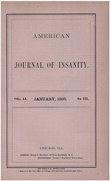Managed care constraints on psychiatrists' hospital practices: bargaining power and professional autonomy
Abstract
OBJECTIVE: The increasing involvement of insurers and hospitals in monitoring patient care is encroaching on the psychiatrist's autonomy in making clinical decisions. This study examined the prevalence of constraints on psychiatric inpatient practices, as well as how characteristics of psychiatrists affect the type and the degree of these external pressures. METHOD: About 2,500 psychiatrists with active hospital affiliations were surveyed by mail, as a subset of APA's 1988 national survey of psychiatrists. They were questioned about whether the hospital or insurers had pressured them to change their inpatient practices or had attempted to discourage admission of certain types of patients. Characteristics of the psychiatrists' background, available from the main survey, were used as independent variables in a set of regression models, with frequency of different constraints as the dependent variables. RESULTS: More than three quarters of those surveyed reported pressure from insurers for early discharge; nearly two-thirds said hospitals limited length of stay; and about half had been discouraged from admitting severely ill patients, the uninsured, or Medicaid recipients. Characteristics of psychiatrists, such as length of time in practice, income, sex, and medical school education outside the United States, were associated with the prevalence of external pressures. CONCLUSIONS: Constraints on psychiatrists' practices are widespread. Their ability to resist pressures depends on their bargaining power, which seems to be lowest for those who have relatively little experience, who are female, or who have gone to medical school outside the United States. Psychiatrists appear to be willing to trade off more constraints for higher incomes. Severely ill patients and those with little or no insurance are more likely than others to be affected by these limits on psychiatrists' autonomy.
Access content
To read the fulltext, please use one of the options below to sign in or purchase access.- Personal login
- Institutional Login
- Sign in via OpenAthens
- Register for access
-
Please login/register if you wish to pair your device and check access availability.
Not a subscriber?
PsychiatryOnline subscription options offer access to the DSM-5 library, books, journals, CME, and patient resources. This all-in-one virtual library provides psychiatrists and mental health professionals with key resources for diagnosis, treatment, research, and professional development.
Need more help? PsychiatryOnline Customer Service may be reached by emailing [email protected] or by calling 800-368-5777 (in the U.S.) or 703-907-7322 (outside the U.S.).



